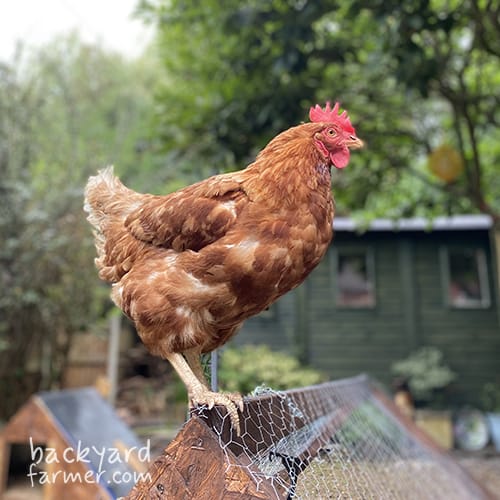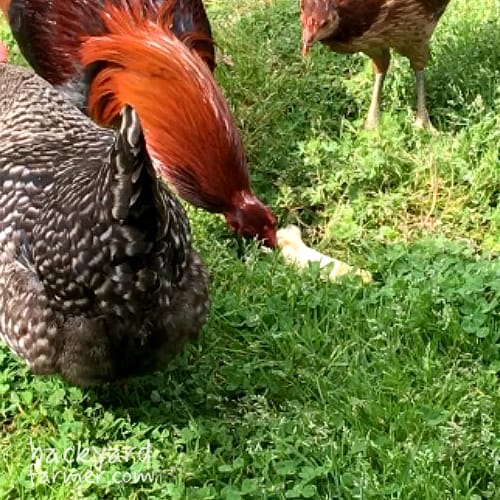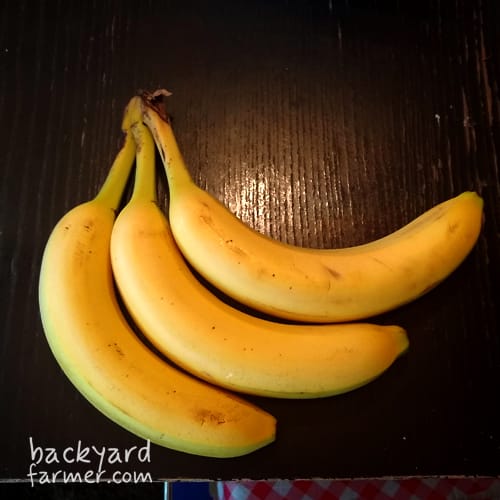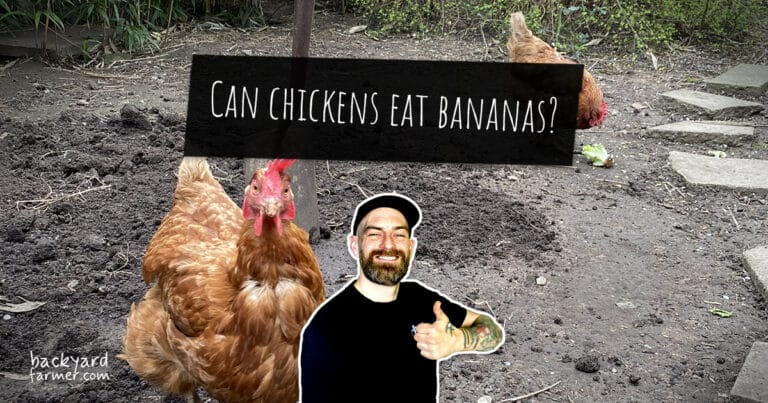Introduction
Can Chickens Eat Bananas? Yes, chickens can eat bananas, and they absolutely love them! These sweet, nutritious fruits make for a delicious treat that adds variety to your flock’s diet. Bananas are rich in essential vitamins and minerals, including Vitamin A, Vitamin B6, magnesium, and niacin, all of which support your chickens’ health when offered in moderation.

Why Are Bananas Good for Chickens?
- Vitamin A: Promotes healthy growth and enhances vision.
- Vitamin B6: Aids in protein metabolism, supporting muscle development.
- Magnesium: Improves calcium absorption, essential for stronger eggshells.
- Niacin: Converts nutrients into energy, keeping chickens active and productive.
What This Article Covers
- The nutritional benefits of bananas for chickens.
- Safe methods for feeding bananas to your flock.
- Tips for incorporating bananas into their diet.
- Creative uses for leftover bananas.
- Monitoring your chickens’ health when introducing new treats.
Whether you’re a seasoned poultry keeper or just starting with your backyard flock, this guide will help you make informed decisions about feeding bananas to your chickens.
Continue your backyard chickens & feeding journey
- What can I feed my backyard chickens? – A comprehensive guide to safe and nutritious foods your flock will enjoy
- Is ACV good for chickens? – Learn how apple cider vinegar can be used in water and what benefits (and cautions) to expect
- Guide — how to feed my chickens egg shells – Practical advice on recycling calcium-rich eggshells back into your flock’s diet safely
Nutritional Benefits of Bananas for Chickens
Packed with Essential Vitamins Bananas are an excellent source of key vitamins that support your chickens’ health:
- Vitamin A: Promotes healthy growth, enhances reproductive health, and helps maintain good vision. A deficiency in Vitamin A can lead to symptoms like conjunctivitis in chickens.
- Vitamin B6: Essential for amino acid metabolism, this vitamin ensures your chickens can efficiently process proteins, supporting muscle development.
- Vitamin C: While chickens produce their own Vitamin C, the additional boost from bananas enhances metabolic performance and supports consistent egg-laying.

Rich in Vital Minerals In addition to vitamins, bananas provide important minerals that contribute to your chickens’ overall well-being:
- Magnesium: Supports the digestion of calcium and phosphorus, crucial for strong eggshells and healthy bones.
- Iron: Facilitates oxygen transport and DNA synthesis, keeping your chickens active and thriving.
- Niacin (Vitamin B3): Converts nutrients like proteins, fats, and carbohydrates into energy, ensuring your flock remains energetic and productive.
Why Bananas Stand Out Compared to other common chicken treats like apples or berries, bananas offer a unique combination of natural sweetness, essential vitamins, and easy digestibility. Their high potassium content provides an added nutritional advantage not commonly found in other fruits.
Low Risk, High Reward Bananas are low in fat and contain natural sugars, making them an excellent occasional treat. Their soft texture ensures they are easy for chickens to eat, reducing the risk of choking.
How to Safely Feed Bananas to Chickens

Whole Bananas: A Fun and Nutritious Treat Chickens love overripe bananas for their sweet, soft texture. To make feeding enjoyable, toss a whole banana (unpeeled) into the coop. Chickens will peck at the peel, working their way to the fruit inside. This natural behavior promotes enrichment and keeps them entertained.
Preparing Banana Peels Banana peels are rich in nutrients but can be tough for chickens to consume unless prepared properly:
- Chop or Blend: Cut the peels into small pieces or blend them to make them easier to eat.
- Use Organic Bananas: Choose organic bananas to avoid exposing your flock to harmful pesticides.
Portion Control While bananas are nutritious, their high natural sugar content means they should only be given as an occasional treat. Follow these guidelines:
- For a small flock, offer half a banana once a week.
- Adjust portions based on the size of your flock to ensure no chicken overindulges.
Precautions for Safe Feeding
- Remove Rotten Bananas: Never feed chickens spoiled or moldy bananas, as these can cause digestive issues.
- Avoid Overfeeding: Excessive banana consumption can lead to diarrhea or a reduced appetite for their balanced feed.
- Introduce Gradually: If it’s their first time eating bananas, start with small amounts to observe their reaction.
Why Feed Bananas Safely? Feeding bananas safely ensures your chickens gain the nutritional benefits without experiencing digestive upset. Following safe feeding practices also prevents health issues such as crop impaction or an imbalanced diet.
Feeding Guidelines and Frequency

How Much Banana Should Chickens Eat? Bananas are a nutritious treat, but they should only make up a small portion of your chickens’ overall diet. Follow these general guidelines:
- Small Flocks: Offer half a banana per week to a flock of 4-6 chickens.
- Larger Flocks: Adjust portions proportionally to ensure each chicken gets a small amount.
- Baby Chicks: Provide only small, blended pieces of banana as an occasional treat to prevent choking.
Why Moderation Matters Bananas are high in natural sugars, and overconsumption can lead to:
- Digestive Problems: Too much banana may cause diarrhea or crop impaction.
- Diet Imbalance: Overfeeding treats can reduce their intake of essential feed, leading to nutritional deficiencies.
Best Practices for Feeding Bananas
- Offer as a Treat: Bananas should make up no more than 5-10% of your chickens’ total diet. This helps maintain their health and prevents diet-related issues.
- Combine with Balanced Feed: Always ensure a high-quality chicken feed is the primary source of nutrition. Avoid replacing essential grains and proteins with treats.
- Keep It Fresh: Feed ripe, clean bananas, and promptly remove leftovers to avoid attracting pests or mold.
Seasonal Feeding Tips
- In hot weather, frozen banana pieces provide a refreshing snack to cool your chickens.
- During winter, bananas offer a quick energy boost to support their metabolism in colder conditions.
Special Considerations for Chicks
Can Baby Chicks Eat Bananas?
Yes, baby chicks can eat bananas, but their delicate digestive systems require special precautions. While bananas offer valuable nutrients, they should only be given in small quantities and prepared appropriately.
How to Safely Feed Bananas to Chicks
- Choose Organic: Opt for organic bananas to reduce exposure to harmful pesticides or chemicals.
- Blend or Mash: Blended or mashed bananas are easier for chicks to consume and digest. Avoid offering large chunks that could pose a choking hazard.
- Pair with Balanced Feed: Offer bananas as a supplemental treat, not a replacement for essential starter feed. For a complete nutritional foundation, refer to our [starter feed guide for chicks].
Frequency and Portion Sizes
- Provide small portions no more than once a week.
- For a small group of chicks, a teaspoon of mashed banana per chick is sufficient.
Monitoring Chick Health
Watch for the following signs to ensure your chicks tolerate bananas well:
- Normal Behavior: Chicks should remain active, alert, and curious after eating.
- Healthy Digestion: Check for normal droppings to confirm they are processing the treat properly.
While bananas make a great occasional treat, you can also enhance your chickens’ diet with other natural supplements, such as apple cider vinegar. Learn more about its benefits in our guide: Is ACV Good for Chickens?.
Important Notes
- Avoid overfeeding bananas, as this can disrupt their diet and cause digestive upset.
- Always prioritize high-quality starter feed to support proper growth and development.
By following these guidelines, you can safely introduce bananas to baby chicks, providing them with a fun and nutritious treat while supporting their healthy growth.
Creative Uses for Leftover Bananas
Frozen Bananas: A Refreshing Treat
During hot weather, frozen bananas can provide chickens with a cooling and hydrating snack. Here’s how to prepare them:
- Peel and slice ripe bananas into small pieces.
- Place the pieces on a tray and freeze until solid.
- Offer the frozen banana chunks directly to your chickens on hot days.
Banana Peel Fertilizer
Don’t throw away those banana peels! Repurpose them into a nutrient-rich fertilizer for your garden:
- Chop the peels into small pieces.
- Add them to your compost pile or bury them directly in the soil near plants.
- Over time, the peels will decompose, releasing potassium, phosphorus, and calcium into the soil.
Banana Mash for Treat Blends
Leftover bananas can be mashed and mixed with other treats to create a nutrient-packed snack:
- Combine mashed bananas with oats, mealworms, or leftover greens for a delicious and enriching treat.
- Shape the mixture into small balls and refrigerate for a few hours before serving.
Using Overripe Bananas Wisely
Bananas that are too ripe for human consumption are perfect for chickens. Their softer texture and sweeter taste make them ideal for your flock.
Eco-Friendly Benefits
Finding creative ways to use leftover bananas and peels reduces food waste while enriching your chickens’ diet and your garden. This sustainable approach supports chicken care, enhances composting efforts, and improves soil health.
Monitoring Chicken Health
Signs of Digestive Issues
When introducing bananas or any new treat to your chickens’ diet, it’s important to monitor their health for potential digestive problems. Look for these warning signs:
- Diarrhea: Overconsumption of bananas can result in loose droppings due to their high sugar content.
- Discolored Droppings: Bright or unusual colors in droppings may indicate digestive upset or poor tolerance.
- Crop Impaction: A hard or persistently full crop could signal impaction caused by indigestible materials or overeating.
Best Practices for Maintaining Health
- Introduce Treats Gradually: Start with small portions of bananas to observe how your chickens react.
- Provide Fresh Water: Ensure clean, fresh water is always available to aid digestion and prevent dehydration.
- Maintain a Balanced Diet: Treats like bananas should make up no more than 5-10% of the total diet to prevent nutritional imbalances.
Cautionary Notes
- Avoid offering multiple high-sugar treats alongside bananas to prevent excessive sugar intake.
- Monitor your chickens closely during the first few feedings of new treats to identify any adverse reactions.
What to Do If Problems Arise
If you notice signs of digestive distress:
- Temporarily remove bananas and other treats from their diet.
- Observe their behavior and droppings for improvement over the next 24-48 hours.
- Consult a veterinarian if symptoms persist or worsen.
The Importance of Observation
Regularly observing your flock’s behavior and health is essential to their well-being. Chickens that are active, curious, and eating their primary feed alongside treats like bananas are typically in good health. For more detailed information on common chicken health issues, check out our [comprehensive guide to chicken health]. By staying attentive, you can safely introduce new treats while ensuring your chickens remain happy and healthy.
FAQs
Yes, chickens can eat banana peels. However, peels are tough and fibrous, so it’s best to chop or blend them to make them easier for chickens to consume. Using organic bananas is recommended to minimize pesticide exposure.
Bananas are safe for baby chicks when prepared properly. Mash or blend small amounts of banana and offer it as an occasional treat alongside their starter feed.
Chickens can enjoy bananas as a treat once a week. Bananas should make up no more than 5-10% of their overall diet to maintain a healthy nutritional balance.
Overconsumption of bananas can cause digestive issues such as diarrhea or reduced appetite for their main feed. Monitoring portion sizes helps prevent these problems.
Yes, overripe bananas are ideal for chickens. They are softer, easier to eat, and their sweeter taste is often more appealing to chickens.
Bananas are excellent treats year-round. In hot weather, frozen banana slices can help cool your chickens, while fresh bananas provide energy during colder months.
Yes, chickens can also enjoy other fruits such as apples (without seeds), berries, and watermelon as occasional treats. Always prepare fruits safely for consumption and avoid harmful options like avocados and citrus, which can upset digestion.
Absolutely! Frozen bananas are a refreshing and hydrating snack during hot weather. They help regulate body temperature and keep your chickens comfortable.
Conclusion
Bananas are a nutritious and enjoyable treat for chickens when fed in moderation. Packed with essential vitamins (A, B6, C) and minerals (magnesium, niacin), they provide a healthy boost to your flock’s diet. However, it’s important to ensure bananas make up only 5-10% of their overall nutrition to maintain balance and avoid digestive issues.
By following the guidelines in this article, you can safely introduce bananas to your chickens while prioritizing their health and happiness. Remember to:
- Offer bananas as an occasional treat: Limit to once a week for optimal health.
- Monitor their health and digestion: Watch for signs of overconsumption, such as diarrhea or reduced appetite.
- Use leftover bananas creatively: Freeze them for summer snacks or repurpose peels as garden fertilizer to enrich your soil.
Explore More Chicken Feeding Tips
If you’re curious about what other fruits and vegetables are safe for chickens, check out this comprehensive guide on fruit and vegetables for chickens to explore more options.
Whether you’re an experienced poultry keeper or new to chicken ownership, this information will help you make informed decisions about feeding your flock. Keep experimenting with safe treats to enrich their diet and daily routine—your chickens will thank you for it!
We’d love to hear about your experiences! Share your favorite chicken treats or creative ways you’ve reused bananas in the comments or on our social media pages. Happy chicken keeping!





